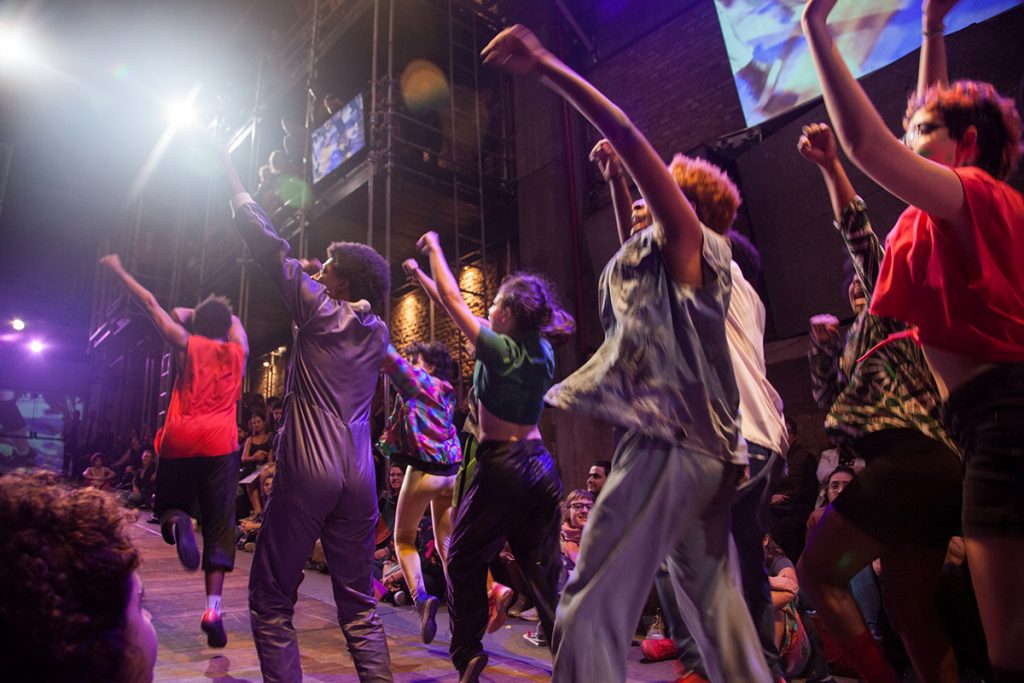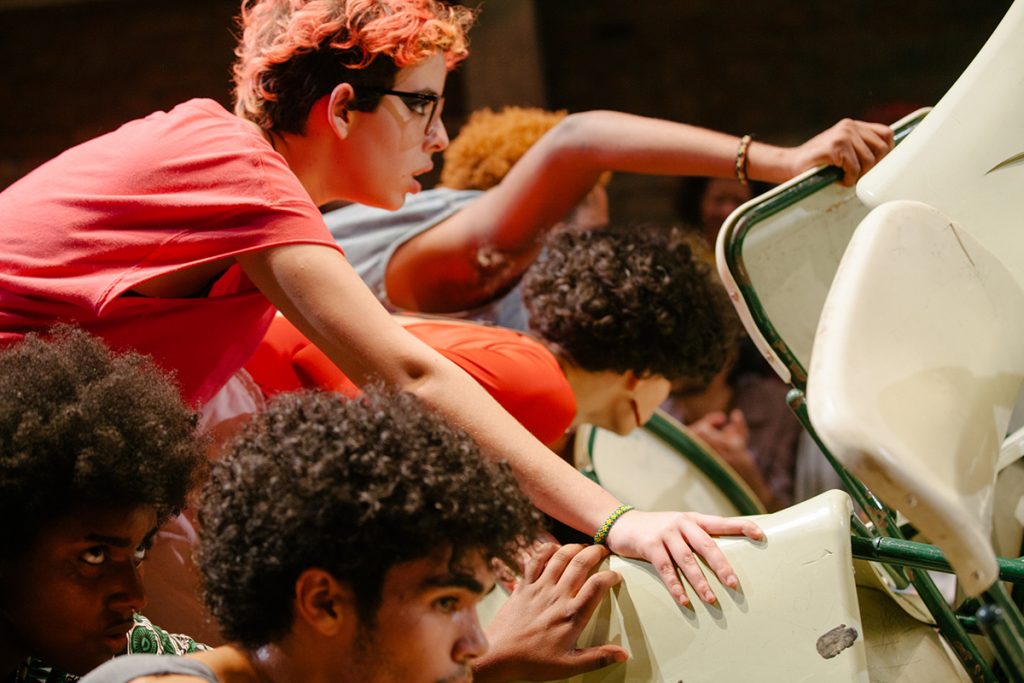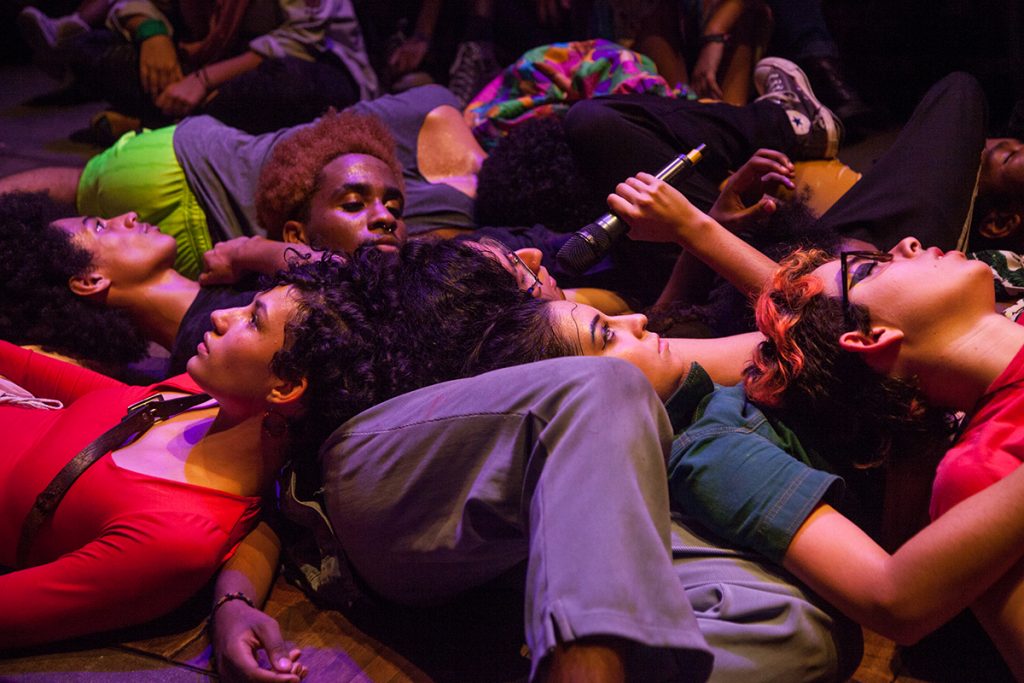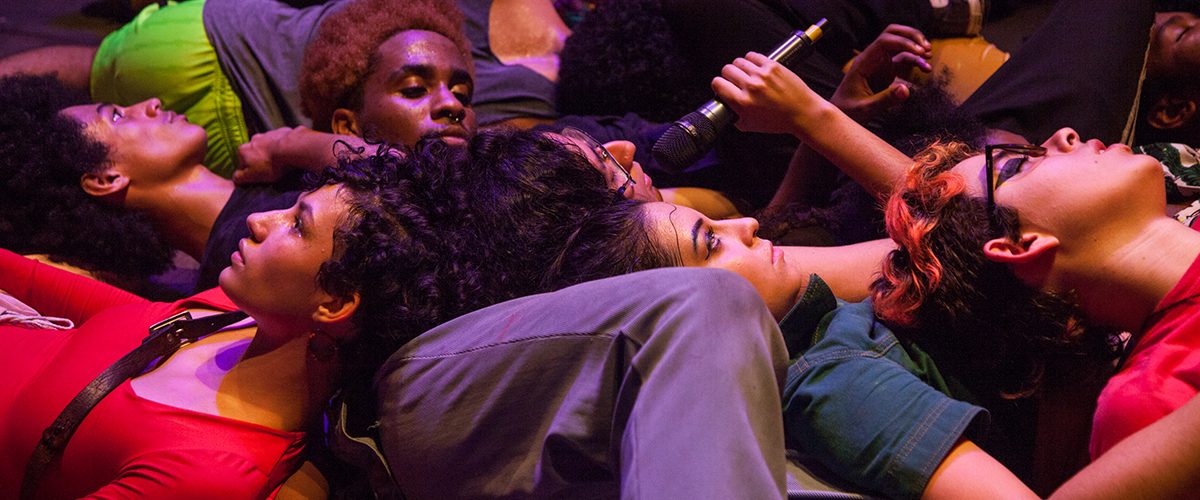Activist and performer, Lilith Cristina and producer Lowri Evans, talk about When it Breaks it Burns, the true story of high school protests in Brazil.
When it Breaks it Burns tells the extraordinary true story of the high school occupations of 2015 and 2016 in Brazil – when students barricaded themselves inside schools for up to three months protesting spending cuts.
This student activism changed the lives of those involved forever. Now 15 of the participating students are bringing their remarkable story to the stage with Sao Paulo based theatre company, ColetivA Ocupação.
Quays Life talks to former activist and performer, Lilith Cristina and producer Lowri Evans, former Contact Young Company member and artist who lives and works between São Paulo and the UK.

Q: Lowri, what first led you to live and work in Brazil?
Lowri: I worked with a theatre company from Sao Paulo in 2009 with Contact Young Company. It was a site-specific show called Memoria da Chuva (Memory of the Rain) at Museum of Science and Industry. I felt a big connection with the artists I met and by the end, on the last day of the year, I flew to Brazil for the first time for a holiday. I became involved in a long-distance relationship, became part of a community of artists, learnt Portuguese, got married, made two plays, various performances, split-up with my partner and now I belong there as much as ever.
I love the people, the culture, the fruits, the sun, the art scene, the city. I have amazing friendships there, one of which is with Martha Kiss Perrone, who has directed and performed in Roza (2014-2017) and Revolta Lilith (2018) and directs When It Breaks It Burns.
Q: How has working in Brazil changed your perspective on your life as an artist?
Lowri: It has really opened my eyes, like any new experience it exposes you to other ways of life. As a foreigner you really notice everything, which is quite useful as an artist. Also, being far away gives your home a new perspective. I have learnt so many things from the artists I’ve worked with, i.e. approaches to working in new spaces, ways to connect with other bodies.
Q: When and how did you first hear about ColetivA Ocupação?
Lowri: Through the director Martha. When she heard there were students occupying their high school in 2015, she picked up a camera and ran to join them. She filmed inside the occupations as well as on the streets in the protests. She got to know the young people, and they got to know her.
At that time, we were performing a show called Roza, about Rosa Luxemburg and the current Brazilian political situation. Her words and actions from 100 years ago were as relevant and as contemporary as when she first wrote them and had a lot to do with the protests, against the state, that were happening in response to increases in public transport fares and public education reforms.
As the play reflected on what was happening at the time, the story of the high school protests entered the show. We then toured around those occupied schools. After seeing Roza, the students wanted to tell their story; so Martha began giving workshops, which were beautiful and explosive, and after doing some small scratch performance interventions – one of which Amy Letman of Transform Festival saw when she was in Sao Paulo, and immediately knew this show had to come to the UK – they developed ‘When It Breaks It Burns’ over a year, with Martha directing.

Q: Lillith, can you briefly tell us your story
Lillith: ColetivA Ocupação is a theatre group formed by students, artists, actors, dancers, creators that occupied your schools in November 2015 in protest against a project that will close more that 100 public schools in districts of São Paulo.
The secundarist movement occupied more than 200 public schools for about 3 months. The experience continued in different ways, one of them is the political art and the spectacle ‘When it Breaks it Burns’.
Q: How has the experience changed your view of education and or student student activism?
Lillith: Inside the schools we discovered who we are, the different space in school, found new meanings. And the importance of education from our perspective, in our narrative.
Q: What led to to the story being told on stage?
Lillith: During the experiences of the occupations, the students lived through many things, for example police repression and traumatic silencing of stories.
The show is a way to tell the world about this experience, and for us to elaborate and reflect on our stories.
The high school student (‘secundarist’) movement is the most important in recent times in Brazil.

Q: Why was important to creative an interactive production fusing music, dance and performance?
Lillith: The art, the theatre, is a way of reclaiming space and this is the way we found to tell our story.
Telling our stories we found ourselves in places that had previously been denied to us, and we made people get into places that had been denied to them.
With the music, dance and performance we found our beauty, our liberty, our sexuality, our identity, ancestry, and our presence in the world.
Q: Why is it important to you that UK audiences see this work?
Lillith: We are still discovering what it means to do this show on the other side of the world, as it is our first international travelling and working in a group, making together and telling to the people our stories.
Actually the political context in Brazil is awful, with a Conservative President, the same way you have the Brexit, it´s a complex context.
But when we arrived here, seeing the schools here, that have the other structures, accessibility, and provision. It’s so different from Brazil where the schools are like a prison. So, is very important that British people experience this cultural shock with different contexts.
CONTACT AND TRANSORM PRESENT: COLETIVA OCUPAÇÃO: WHEN IT BREAKS IT BURNS directed by Martha Kiss Peron at Millennium Powerhouse on 8 and 9 May 2019.
When it Breaks It Burns is performed in Portuguese with English surtitles.
Read about the dream-like luminarium heading to Salford Quays.





